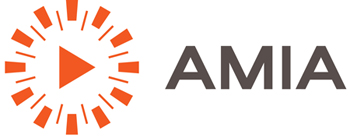Do It Yourself & Community Archiving Symposium Presentations
During AMIA 2016, the Do It Yourself & Community Archiving stream of sessions was opened free to the community as a symposium and live-streamed. This was the first time AMIA has offered live streaming. A huge thank you to the organizers of the program stream – Robin Margolis and Kelly Haydon – and to the Conference Online Task Force – Dinah Handel, Erwin Verbruggen, and Kristin Lipska – for working to make the stream accessible to everyone. And thanks to AVPreserve for sponsoring the live-stream!
Recordings and presentations below. Presentations will be added as they are received.
Building Regional AV Preservation Coalitions Using the Community Archiving Method
The Community Archiving Workshop (CAW) model is growing. Now going into its 7th year, the CAW Organizing Committee proposes to establish regional coalitions, which will serve as anchors for local AV preservation efforts. The CAW proposes to meet increasing demand with the establishment of a Training of Trainers curriculum that can be disseminated widely in partnership with regional archives and organizations. Next steps for the CAW include the development of a Training of Trainers curriculum, an enhanced Organizer’s Toolkit and support to strengthen regional networks for AV preservation.
Speakers: Mona Jimenez, NYU Moving Image Archiving and Preservation Program; Yvonne Ng, Witness; Marie Lascu, XFR Collective; Kelli Hix, Smithsonian Institution; Sandra Yates, McGovern Historical Center, Texas Medical Library
Part I
Part II
_________________________
Real Talk: Archiving Independent Media and Community Collections
Accepted standards and best practices for audiovisual archiving usually emerge from institutional contexts (e.g. libraries, universities, professional organizations), and are not always applicable or sufficient when working with community-based groups or alternative media-makers. How do archivists working in traditional institutions foster more reciprocal and collaborative relationships with communities to preserve their histories? What are the affective, emotional, or other social dynamics involved with archiving documentation of police violence? What are some lessons learned from participatory approaches to archiving the work of independent artists and the collections of grassroots media distributors?
Speakers: Molly Fair; Kelly Haydon, Bay Area Video Coalition; Keith Wilson , People’s Archive of Police Violence; Carol Steiner, People’s Archive of Police Violence; Caroline Gil, Independent Archivist; Skyla Hearn , DuSable Museum of African American History
_________________________
Documenting A Changing Pittsburgh: East of Liberty Films and the Impact of Gentrification
This session will feature director Chris Ivey speaking and sharing clips from his ongoing documentary project East of Liberty. Entering its fourth installment, the East of Liberty series explores the hopes and fears of community members in a neighborhood experiencing rapid redevelopment, aiming to “create a historical record that captures the essence of community change and exposes taboos in frank conversation-from displacement to neighborhood violence to discussions of race and class.” Ivey will speak to the challenges of working responsibly with community members to portray a changing neighborhood, as well as share segments from previous films and a preview of the newest chapter, Youth Rising. He will be joined by East Liberty residents connected to the films.
Speakers: Robin Margolis, UCLA; Chris Ivey , East of Liberty film Series and Hypeboy Media
_________________________
Tech in Community, Community in Tech: Digital Collections in the Real World
From receiving digitized video files back from vendors, to bash shell scripting, archivists are frequently finding themselves as the technology leads of their underfunded departments, or newly managing contractors for technology projects. This session will introduce some software programs that archivists have used to make their lives easier, and discuss strategies for taking the fear out of technology in the archives. Panelists will introduce a handful of tools and scripts that help facilitate different areas of a digital collections’ lifecycle, as well as discussing workplace matters and experiences in the field.
Speakers: Lauren Sorensen, UCLA; Rachel Mattson , La MaMa Archives; Nicole Martin, Human Rights Watch; Dinah Handel, New York Public Library; Kristin Lipska, California Audiovisual Preservation Project (CAVPP)
_________________________
Think-For-Yourself, Do-It-Yourself: Revealing Independent Media from Behind the Iron Curtain
Artists, activists, and archivists embrace do-it-yourself strategies at times of political and social unrest for free expression, communication, and survival of marginalized voices. Between 1950 and 1990, political suppression paradoxically sparked creative action across the underground arts scene of Eastern Europe from secret concerts, actions, and happenings to self-published zines and media. This presentation explores salvaged collections hidden behind the Iron Curtain, how artists became accidental archivists, and where collections once concealed in basements or confiscated by secret police have ended up today and how they are being preserved. Case studies describe the methodologies of archives throughout Europe where independent and community archiving actions are taking place despite limited environments to safeguard these collections, and how prominent figures from the underground scene are active in archiving. This presentation stems from on-site research for my 2015 MIAP thesis “I Will Counterrevolution / I Will Stop All The Motion: Archiving Exile, Samizdat, and Underground Audio from the Eastern Bloc”.
Speaker: Allie Whelan
